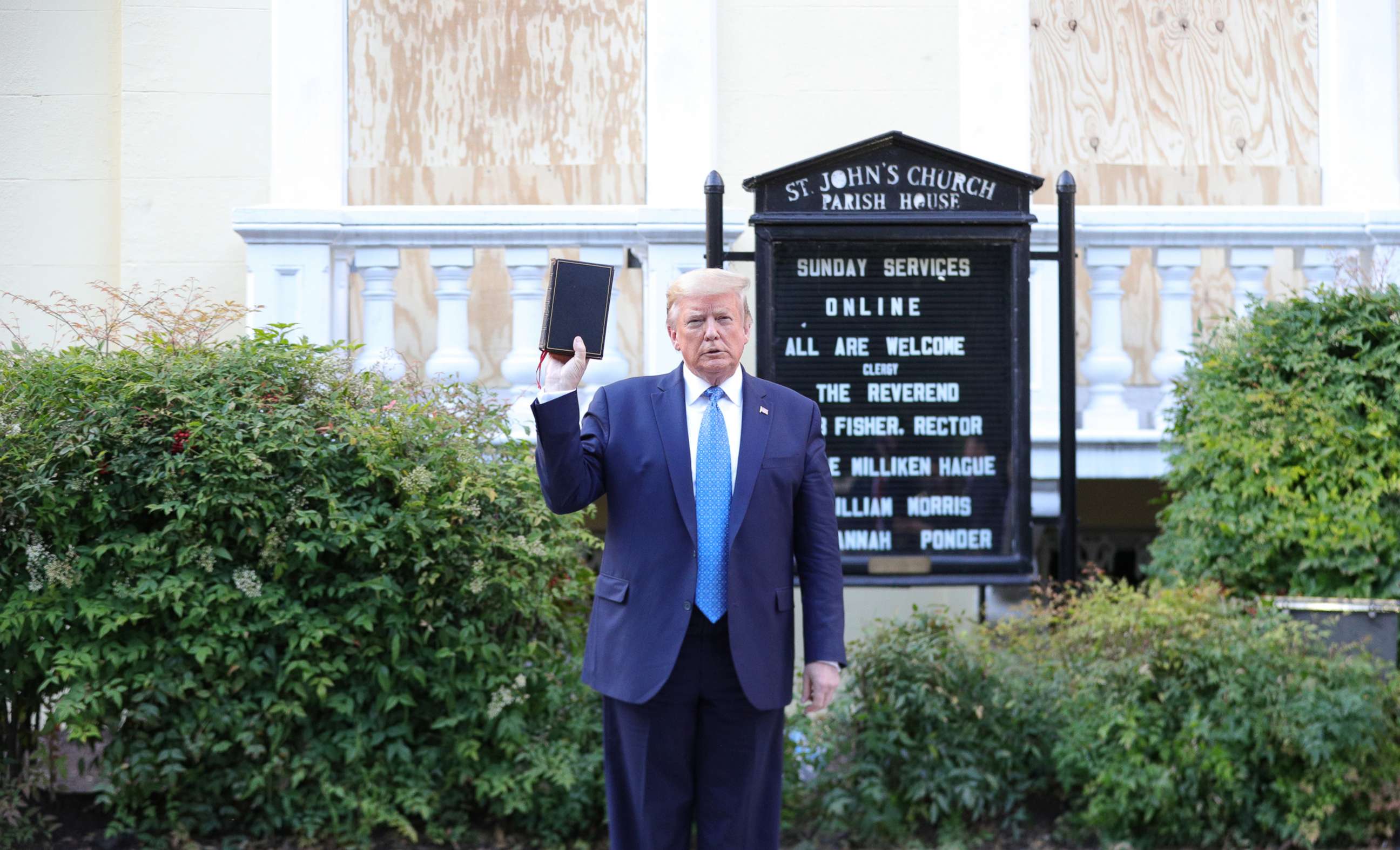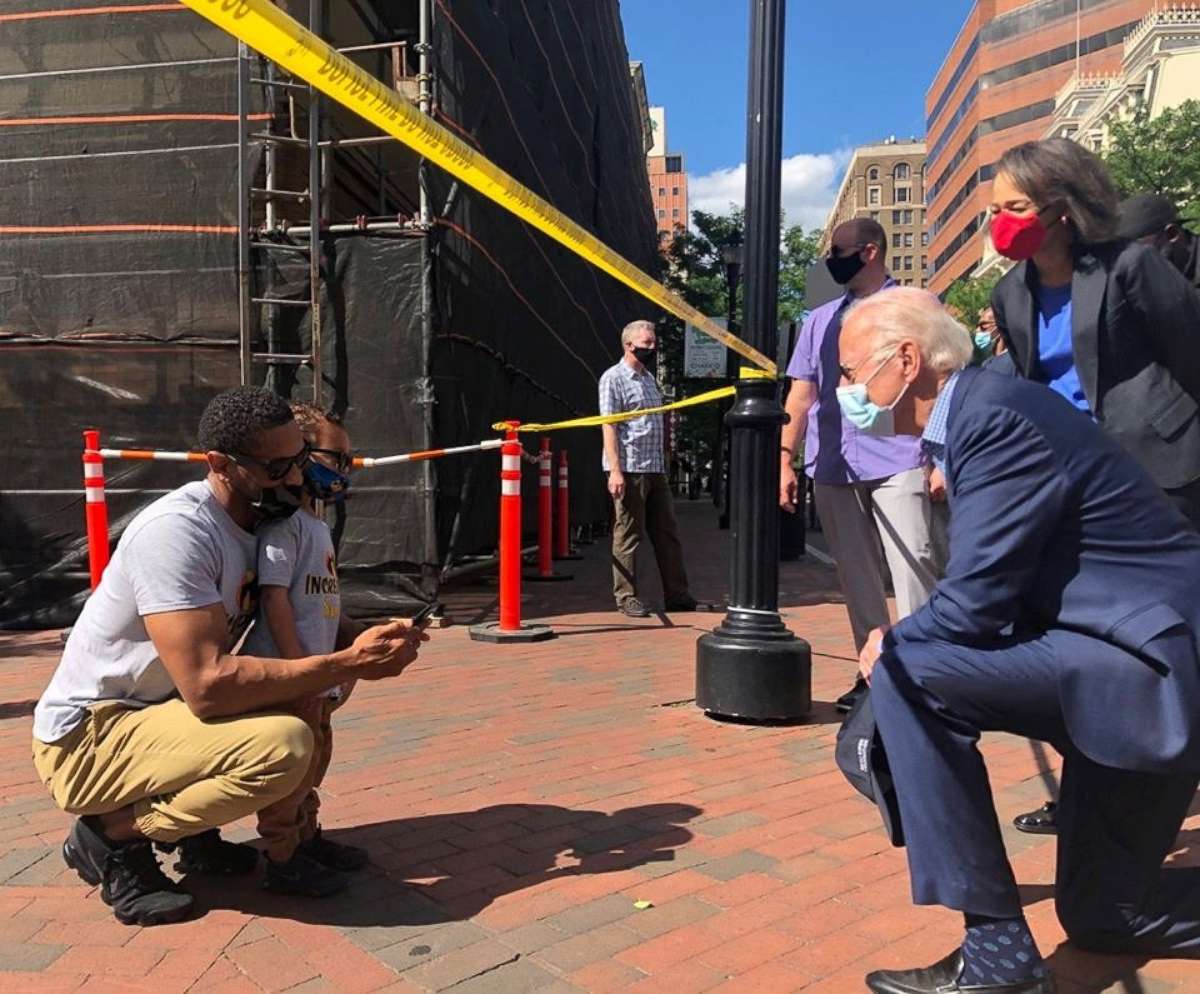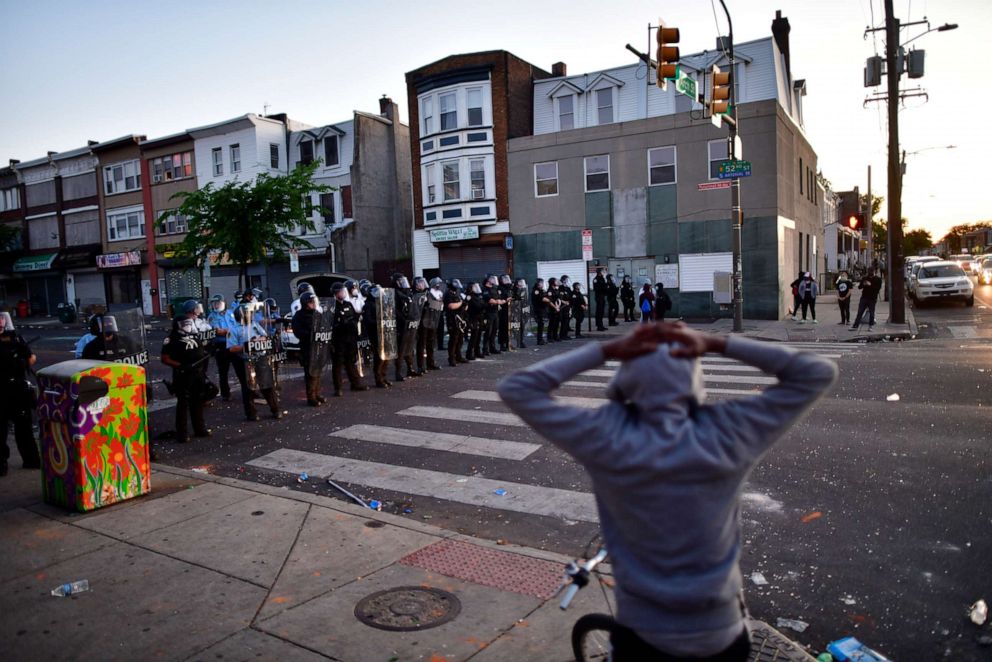The Note: Trump's quick response to protests highlights slow response to coronavirus
Trump was quick to call for the use of military force within U.S. borders.
The TAKE with MaryAlice Parks
The president hesitated to mobilize military assets to help produce needed protective gear and add resources in the fight against the coronavirus, but he was quick to press for what would be a remarkable use of military force within our own borders, against U.S. citizens nonetheless, who are protesting police brutality.
Of course there is a difference between protesters and rioters, but it is clear that this president views even peaceful and calm protesters differently depending on their message.
A month ago, President Donald Trump expressed support and sympathy for the armed protesters in Michigan who stood in opposition to health care recommendations. Fast-forward to Monday, when calm protesters, demonstrating in front one of the most famous and common places to demonstrate in the country -- the White House -- were met with tear gas and flash bangs deployed by federal and military police.

It was a brazen and frighteningly authoritative move that seemed designed to clear space for a photo opportunity in front of the nearby Episcopalian church. The president may have wanted to show his face, but that does not mean he was welcomed.
The bishop of Washington wasted no time blasting him for the move.
"I am outraged," Washington Bishop Mariann Edgar Budde said. "We distance ourselves from the incendiary language of this president. We follow someone who lived a life of nonviolence and sacrificial love. We align ourselves with those seeking justice for the death of George Floyd."
With National Guard troops deployed across the country too, voting this primary day will seem laughable to some.
Voters in eight states and the District of Columbia weigh in Tuesday, marking the single biggest day of voting since the spread of the coronavirus, which caused many states to delay their primaries. On the other hand, the reality of a nation inflamed -- hurting and conflicted -- is perhaps a reminder of other moments in history when Americans struggled for, among other rights and liberties, fair access to the ballot box. The backdrop may also renew interest in local politics.
The RUNDOWN with Alisa Wiersema
On Monday, as protests continued around the country, Trump and his presumed 2020 rival, former Vice President Joe Biden seemed to operate in politically different, but parallel universes.
They both spent time communicating with local leaders across the country.
For the president, that involved holding an angry call with governors, during which he said they "have to dominate" and said most of them "are weak." In Delaware, Biden held a virtual roundtable with mayors of four cities that have been experiencing significant protests in the wake of George Floyd's death. The former vice president addressed the protests and said the anger of those in attendance is "justified," while also adding that Floyd's death "has evoked the full weight of our history."
Both men also visited churches.

After police forced out peaceful protesters who were gathered around St. John's Church in the nation's capital, Trump and his staff walked to the historic building, where he posed with a Bible in hand before returning back to the White House. Biden, after months of virtual events broadcast from his home, spent his first in-person campaign event in over two months hearing from members of the African American community at Bethel AME Church in Wilmington.
"I want to make something clear. I don't expect anything in the black community. I don't take -- I've never taken it for granted," Biden said, adding that he has to "earn" their votes in this election.
Biden appears to be working toward that goal with plans Tuesday to deliver in-person remarks on the "civil unrest facing communities across America," in Philadelphia. Meanwhile, as Americans continue to digest the events unfolding across the country, many are likely wondering what Trump's next move will be amid the dual crises of the coronavirus pandemic and ongoing civil frustration.
The TIP with Quinn Scanlan
Even as the coronavirus has upended elections, in Pennsylvania, lawsuits seeking to extend the deadline for voters to return their mail-in ballots have repeatedly failed in the courts. But now, amid mass civil unrest in parts of the state, voters in six counties, including Philadelphia, have an extra week for their ballots to arrive at election offices.
In an eleventh-hour decision Monday, which Republican leaders in the state legislature indicated they may go to court over, Democratic Gov. Tom Wolf signed an executive order allowing for ballots that are in the mail by Tuesday to be counted as long as they arrive before 5 p.m. on June 9 -- a one-week extension. But the rollout of this change was confusing, with the governor not specifying during remarks in Philadelphia that the order only applied to certain counties, and even giving an incorrect, later time on June 9 as the new deadline.

Eyes were already sure to be on Pennsylvania Tuesday, as a critical battleground state tries to pull off a pandemic primary after recently overhauling the election law to allow for a huge influx in mail ballots that -- while a safe alternative to in-person voting -- have inundated county election officials like never before.
Now, the primary -- postponed because of the coronavirus outbreak -- must take place amid that public health crisis and as protesters flood the streets and officials institute curfews in the state's two largest cities. The uncertainty of this moment was apparent in the governor's answer to a reporter who asked him if he foresees any additional impact on election day: "I don't know."
BRINGING AMERICA BACK
High blood pressure affects nearly half of Americans. One study found it was even more common among COVID-19 patients in the ICU. Researchers are trying to figure out why. Read this story and more by checking out Bringing America Back, an ABC News feature that highlights the day's top stories in economic recovery and medical preparedness amid the coronavirus pandemic.
THE PLAYLIST
ABC News' "Start Here" podcast. Tuesday morning's episode features ABC News Chief Global Affairs correspondent Martha Raddatz, who explains why President Donald Trump is calling in the military to help quell protests. Temple University professor Marc Lamont Hill joins us to discuss the dynamics between the peaceful protesters and looters at these demonstrations. And, former San Bernardino police chief and ABC News contributor Jarrod Burguan examines how police have handled the unrest thus far. http://apple.co/2HPocUL
The FiveThirtyEight Politics Podcast. Protests have spread across the country in the week since George Floyd died after a Minneapolis police officer kneeled on his neck for more than eight minutes. In this installment of the FiveThirtyEight Politics podcast, FiveThirtyEight contributor and Campaign Zero co-founder Samuel Sinyangwe joins the crew to analyze the trends in police violence over the past six years. They also discuss how the protests -- along with looting and the violent exchanges with police -- could shape electoral politics in the coming months. https://53eig.ht/2Xln8hg
WHAT YOU NEED TO KNOW TODAY
Download the ABC News app and select "The Note" as an item of interest to receive the day's sharpest political analysis.
The Note is a daily ABC News feature that highlights the day's top stories in politics. Please check back tomorrow for the latest.



